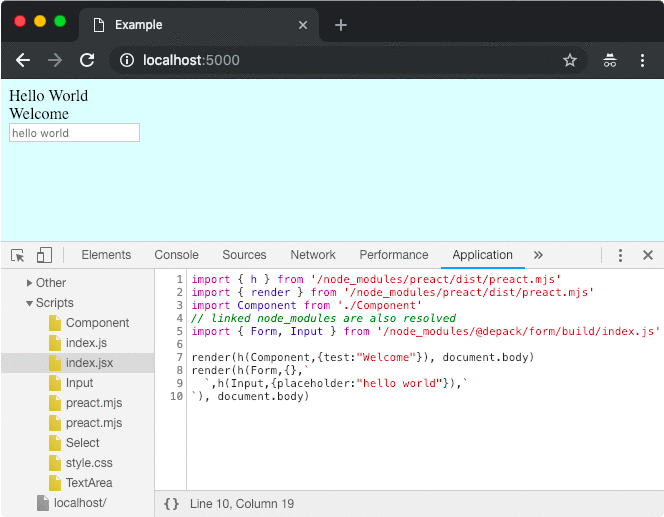@idio/frontend
@idio/frontend is The Middleware To Serve Front-End JavaScript. It allows to set-up the modern front-end development environment where node_modules are served alongside compiled JSX code (without using Babel, see @a-la/jsx).

yarn add @idio/frontend
npm i @idio/frontendTable Of Contents
- Table Of Contents
- API
-
frontEnd(config=: FrontEndConfig): !_goa.Middleware - Hot Reload
- Copyright & License
API
The package is available by importing its default function:
import frontend from '@idio/frontend'
frontEnd(
config=: FrontEndConfig,
): !_goa.Middleware
Create a middleware to serve Front-End JavaScript, including JSX and node_modules.
-
config
FrontEndConfig(optional): Options for the middleware.
The middleware constructor will initialise the middleware function to serve files from the specified directory or directories (frontend by default). The files will be updated on-the-fly to fix their imports to relative paths (e.g., preact will be transformed into /node_modules/preact/dist/preact.mjs). Any CSS styles will also be served using an injector script.
Files served with this middleware, either transpiler or plain JS, will be cached using their mtime. There is no need to compute md5 because this middleware is meant for the development purposes, whereas production code can be built with Depack.
FrontEndConfig: Options for the middleware.
| Name | Type | Description | Default |
|---|---|---|---|
| directory | (string | !Array<string>) | The directory or directories from which to serve files. | frontend |
| mount | string | The directory on which to mount. The dirname must be inside the mount. E.g., to serve example/src/index.js from /src/index.js, the mount is example/src and directory is src. |
. |
| override | !Object<string, string> | Instead of resolving the package.json path for packages and looking up the module and main fields, paths can be passed manually in the override. E.g., { preact: '/node_modules/preact/src/preact.js' } will serve the source code of Preact instead of the resolved dist version. |
- |
| pragma | string | The pragma function to import. This enables to skip writing h at the beginning of each file. JSX will be transpiled to have h pragma, therefore to use React it's possible to do import { createElement: h } from 'react'. |
import { h } from 'preact' |
| log | (boolean | !Function) | Log to console when source files were patched. | false |
| jsxOptions | !_alaJsx.Config | Options for the transpiler. | - |
| exportClasses | boolean | When serving CSS, also export class names. | true |
| hotReload | !HotReload | Enable hot reload for modules. Requires at least to implement getServer method so that WebSocket listener can be set up on the HTTP server. |
- |
The middleware can be used in any Koa application, or within the idio web server.
import idio, { render } from '@idio/idio'
import frontend from '@idio/frontend'
/**
* @param {import('..').FrontEndConfig} options
*/
export default async (options = {}, src = 'example/frontend') => {
const { url, app, router, server } = await idio({
// logger: { use: true },
_frontend: {
use: true,
middlewareConstructor() {
return frontend({
directory: ['example/frontend', 'example/reload'],
...options,
})
},
},
}, { port: process.env.PORT })
router.get('/', async (ctx) => {
ctx.body = render(<html>
<head><title>Example</title></head>
<body>
Hello World
<div id="app" />
<script type="module" src={src}/>
</body>
</html>, { addDoctype: true })
})
app.use(router.routes())
console.error('Started on %s', url)
return { app, url, server }
}example/frontend
├── Component.jsx
├── index.jsx
└── style.css
The entry point
import { render } from 'preact'
import Component from './Component'
// linked node_modules are also resolved
import Form, { Input } from '@depack/form'
const component = <Component test="Welcome"/>
const form = (<Form>
<Input placeholder="hello world"/>
</Form>)
let c = render(component, window['app'])
let f = render(form, document.body)The component
import { Component } from 'preact'
import './style.css'
export default class Example extends Component {
constructor() {
super()
this.state = {
count: 0,
}
}
render({ test }) {
const { count } = this.state
return (<div onClick={() => {
this.setState({ count: count + 1 })
}}>{test} + updated + {count}</div>)
}
}The style
body {
background: lightcyan;
}Hot Reload
This package supports hot reload of modules, mainly for the purpose of developing Preact apps.
HotReload: Options for hot reload (real-time automatic update of code in browser).
| Name | Type | Description | Default |
|---|---|---|---|
| path | string | The path from which to serve the operational module that provides admin methods. | /hot-reload.js |
| module | boolean | Whether to serve the hot-reload script as a module. | true |
| ignoreNodeModules | boolean | Whether to ignore paths from node_modules. |
true |
| watchers | !Object<string, !fs.FSWatcher> | Pass an empty object here so that references to FSWatchers can be saved. | - |
| getServer* | () => |
The function used to get the server to enable web socket connection. | - |
The middleware will append some code at the end of each original file, and when an update is detected, it will use dynamic import to get references to new methods and classes. When dealing with classes, the prototype of the original class will be changed at run-time. E.g., if a render method is changed, after updating the prototype and rerendering the whole app, a new render method will be used.
For example, there's a simple component:
import { Component } from 'preact'
import { $Example } from './style.css'
export default class Example extends Component {
constructor() {
super()
this.example = this.example.bind(this)
}
example() {
console.log('clicked')
}
render({ test }) {
return (<div id={test} onClick={this.example}
className={$Example}>
Hello World
</div>)
}
}
export const Example2 = () => {
return (<span>Open Source!</span>)
}
const Example3 = () => {
return (<pre>Art Deco © {new Date().getFullYear()}</pre>)
}
export { Example3 }When hot reload is enabled, it's going to have an additional code at the bottom of the file when served via front-end middleware:
import { h } from '/node_modules/preact/dist/preact.mjs'
import { Component } from '/node_modules/preact/dist/preact.mjs'
import { $Example } from './style.css'
export default class Example extends Component {
constructor() {
super()
this.example = this.example.bind(this)
}
example() {
console.log('clicked')
}
render({ test }) {
return ( h('div',{id:test, onClick:this.example,
className:$Example},
`Hello World`
))
}
}
export let Example2 = () => {
return (h('span',{},`Open Source!`))
}
let Example3 = () => {
return (h('pre',{},`Art Deco © `,new Date().getFullYear()))
}
export { Example3 }
/* IDIO HOT RELOAD */
import { idioHotReload } from '/hot-reload'
if (idioHotReload) {
let _idio = 0
idioHotReload('example/reload/Example.jsx', async () => {
_idio++
const module = await import(`./Example?ihr=${_idio}`)
Example2 = module['Example2']
Example3 = module['Example3']
return {
module,
classes: {
'default': Example,
},
}
})
}Such code registers a listener to messages from the websocket connection.
Enabling Hot Reload
The API provided for the reload is implemented in a JS file served from /hot-reload.js path. It has 2 functions:
-
idioAddHotReload: the function to execute to rerender the app, which needs to be implemented by the developer. This should be imported in the application main entry point. -
idioHotReload: the function to register that a module can be hot-reloaded. Called by auto-generated code from thefrontendmiddleware.
After an update is done, the app needs to be re-rendered. This is why we have to update the entry file to our application a little bit:
import { render, Component } from 'preact'
import Example, { Example2, Example3 } from './Example'
class App extends Component {
render() {
return (<html>
<body>
<Example test="example"/>
<Example2 />
<Example3 />
</body>
</html>)
}
}
const app = (<App />)
const a = render(app, window.app)
/* IDIO HOT RELOAD */
import addHotReload from '@idio/hot-reload'
addHotReload(() => {
render(app, document.body, a)
})In this case, we created a component and passed it for initial render into a container. The return of this function can then be used inside the idioAddHotReload listener to rerender the component without it loosing its state.
Therefore, to enable the reload, add the default export from @idio/hot-reload.
import addHotReload from '@idio/hot-reload'
addHotReload(() => {
render(app, document.body, a)
})The front-end middleware will rename it into /hot-reload path automatically, but when you're building the code with Depack, you should install @idio/hot-reload package, which exports a default dummy function that doesn't do anything, and will be dropped by the compiler so that there's no additional bytes added to the bundle because of the hot reload.
// @idio/hot-reload main:
export default (cb) => {}Status
At the moment, the following works:
- Updating classes, exported like the following:
export default class A {} class B {} class C {} export default B export { C }
- Updating all other exports. When exporting a const, it will be transpiled into a let, because otherwise it's impossible to update the binding.
export const A = () => {} // will become `let` export let B = () => {} const C = () => {} // will become let let D = 'hello' export { C, D }
- Update styles dynamically upon changes to CSS files.
What doesn't work:
- If you're binding a method in a constructor, it won't be updated, since we don't have access to instances and only update prototypes. This actually doesn't work even in
react-hot-reload.class E extends Component { constructor() { super() this.example = this.example.bind(this) } example() { // callback } render() { // example won't be reloaded since it was bound. return (<div onClick={this.example}>) } }
Node-watch
It's recommended to install node-watch which is an improvement to the standard watcher, that deals with bouncing multiple instant refreshes that happen in some IDEs like VS Code.
Copyright & License
GNU Affero General Public License v3.0

|
© Art Deco™ for Idio 2020 |
|
|---|
